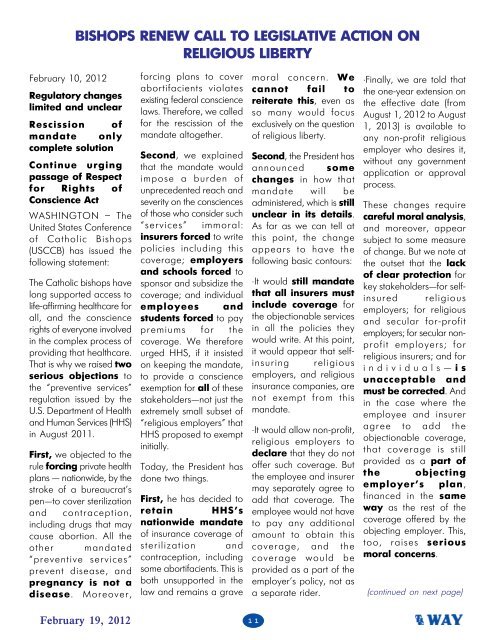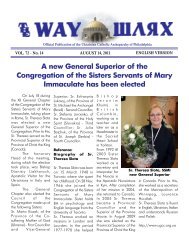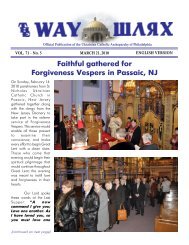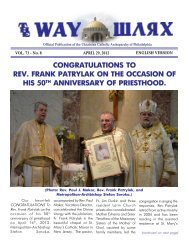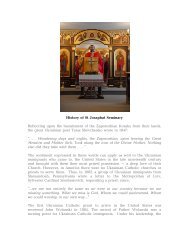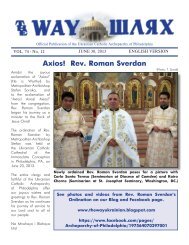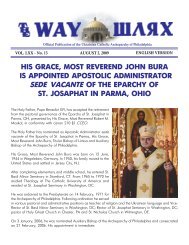The Way - Ukrainian Catholic Archeparchy of Philadelphia
The Way - Ukrainian Catholic Archeparchy of Philadelphia
The Way - Ukrainian Catholic Archeparchy of Philadelphia
Create successful ePaper yourself
Turn your PDF publications into a flip-book with our unique Google optimized e-Paper software.
BISHOPS RENEW CALL TO LEGISLATIVE ACTION ON<br />
RELIGIOUS LIBERTY<br />
February 10, 2012<br />
Regulatory changes<br />
limited and unclear<br />
Rescission <strong>of</strong><br />
mandate only<br />
complete solution<br />
Continue urging<br />
passage <strong>of</strong> Respect<br />
for Rights <strong>of</strong><br />
Conscience Act<br />
WASHINGTON – <strong>The</strong><br />
United States Conference<br />
<strong>of</strong> <strong>Catholic</strong> Bishops<br />
(USCCB) has issued the<br />
following statement:<br />
<strong>The</strong> <strong>Catholic</strong> bishops have<br />
long supported access to<br />
life-affirming healthcare for<br />
all, and the conscience<br />
rights <strong>of</strong> everyone involved<br />
in the complex process <strong>of</strong><br />
providing that healthcare.<br />
That is why we raised two<br />
serious objections to<br />
the “preventive services”<br />
regulation issued by the<br />
U.S. Department <strong>of</strong> Health<br />
and Human Services (HHS)<br />
in August 2011.<br />
First, we objected to the<br />
rule forcing private health<br />
plans — nationwide, by the<br />
stroke <strong>of</strong> a bureaucrat’s<br />
pen—to cover sterilization<br />
and contraception,<br />
including drugs that may<br />
cause abortion. All the<br />
other mandated<br />
“preventive services”<br />
prevent disease, and<br />
pregnancy is not a<br />
disease. Moreover,<br />
forcing plans to cover<br />
abortifacients violates<br />
existing federal conscience<br />
laws. <strong>The</strong>refore, we called<br />
for the rescission <strong>of</strong> the<br />
mandate altogether.<br />
Second, we explained<br />
that the mandate would<br />
impose a burden <strong>of</strong><br />
unprecedented reach and<br />
severity on the consciences<br />
<strong>of</strong> those who consider such<br />
“services” immoral:<br />
insurers forced to write<br />
policies including this<br />
coverage; employers<br />
and schools forced to<br />
sponsor and subsidize the<br />
coverage; and individual<br />
employees and<br />
students forced to pay<br />
premiums for the<br />
coverage. We therefore<br />
urged HHS, if it insisted<br />
on keeping the mandate,<br />
to provide a conscience<br />
exemption for all <strong>of</strong> these<br />
stakeholders—not just the<br />
extremely small subset <strong>of</strong><br />
“religious employers” that<br />
HHS proposed to exempt<br />
initially.<br />
Today, the President has<br />
done two things.<br />
First, he has decided to<br />
retain HHS’s<br />
nationwide mandate<br />
<strong>of</strong> insurance coverage <strong>of</strong><br />
sterilization and<br />
contraception, including<br />
some abortifacients. This is<br />
both unsupported in the<br />
law and remains a grave<br />
moral concern. We<br />
cannot fail to<br />
reiterate this, even as<br />
so many would focus<br />
exclusively on the question<br />
<strong>of</strong> religious liberty.<br />
Second, the President has<br />
announced some<br />
changes in how that<br />
mandate will be<br />
administered, which is still<br />
unclear in its details.<br />
As far as we can tell at<br />
this point, the change<br />
appears to have the<br />
following basic contours:<br />
·It would still mandate<br />
that all insurers must<br />
include coverage for<br />
the objectionable services<br />
in all the policies they<br />
would write. At this point,<br />
it would appear that selfinsuring<br />
religious<br />
employers, and religious<br />
insurance companies, are<br />
not exempt from this<br />
mandate.<br />
·It would allow non-pr<strong>of</strong>it,<br />
religious employers to<br />
declare that they do not<br />
<strong>of</strong>fer such coverage. But<br />
the employee and insurer<br />
may separately agree to<br />
add that coverage. <strong>The</strong><br />
employee would not have<br />
to pay any additional<br />
amount to obtain this<br />
coverage, and the<br />
coverage would be<br />
provided as a part <strong>of</strong> the<br />
employer’s policy, not as<br />
a separate rider.<br />
·Finally, we are told that<br />
the one-year extension on<br />
the effective date (from<br />
August 1, 2012 to August<br />
1, 2013) is available to<br />
any non-pr<strong>of</strong>it religious<br />
employer who desires it,<br />
without any government<br />
application or approval<br />
process.<br />
<strong>The</strong>se changes require<br />
careful moral analysis,<br />
and moreover, appear<br />
subject to some measure<br />
<strong>of</strong> change. But we note at<br />
the outset that the lack<br />
<strong>of</strong> clear protection for<br />
key stakeholders—for selfinsured<br />
religious<br />
employers; for religious<br />
and secular for-pr<strong>of</strong>it<br />
employers; for secular nonpr<strong>of</strong>it<br />
employers; for<br />
religious insurers; and for<br />
individuals—is<br />
unacceptable and<br />
must be corrected. And<br />
in the case where the<br />
employee and insurer<br />
agree to add the<br />
objectionable coverage,<br />
that coverage is still<br />
provided as a part <strong>of</strong><br />
the objecting<br />
employer’s plan,<br />
financed in the same<br />
way as the rest <strong>of</strong> the<br />
coverage <strong>of</strong>fered by the<br />
objecting employer. This,<br />
too, raises serious<br />
moral concerns.<br />
(continued on next page)<br />
February 19, 2012<br />
11


